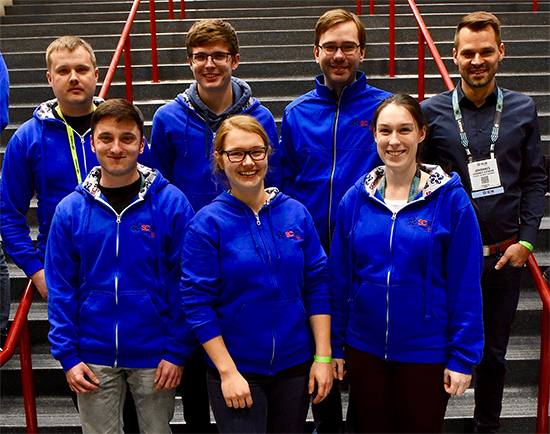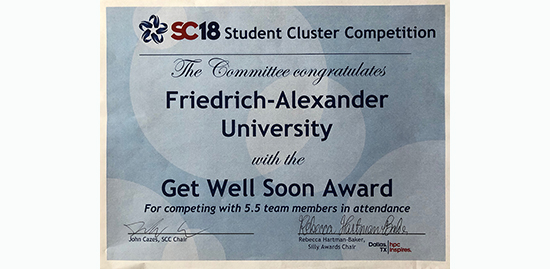NEWSFLASHES
FAU Student Team Delivers Spirited Performance at SC18 Student Cluster Competition
Newsflash –

Team deFAUlt, representing the Friedrich-Alexander University Erlangen-Nuremberg in the SCC at SC18. Back, left to right: Oleksandr Bannov, David Sauerwein, Benedikt Oehlrich (standing in for Marcel Pabst) and adviser Johannes Hofmann. Front, left to right: Manuel Peschel, Eva Dengler and Meike Blöcher.
Copyright: Jo Julia Photography for SC18The Gauss Centre for Supercomputing (GCS) congratulates team deFAUlt for its strong performance in the Student Cluster Competition (SCC) at this year’s Supercomputing Conference (SC18) held in Dallas, Texas, USA. The GCS-sponsored team, six bachelor students representing the Friedrich-Alexander University Erlangen-Nuremberg (FAU), walked away from the 48-hour non-stop SCC challenge with the silver and bronze medals respectively in the hotly contested high-performance computing (HPC) system benchmark tests, the High-Performance Linpack (HPL) and the High-Performance Conjugate Gradients (HPCG) benchmarks. In the overall rankings, the students captured a respectable fifth place.
Team deFAUlt was the only German participant among the 15 international teams competing in the SCC, which is traditionally embedded in the annual Supercomputing Conference, the world’s premier HPC event attended by representatives of the global HPC community.
Adding to the challenge of the competition’s benchmarking components, in which the FAU students did particularly well, students are given very strict overall guidelines that the team’s self-assembled compute cluster must never exceed a 3,000 watt power limit, or they will be penalized. ”We probably could have done better had our sixth team member, Marcel, with his background as industrial electronics technician, been able to be with us on site,“ reflects Johannes Hofmann, adviser of the FAU team. “Marcel had been pulled out of the venture only the day prior to our departure because his doctor, for medical reasons, advised him against boarding a plane,” explains Hofmann. Thus, the team arrived in Dallas with only five rather than the obligatory six team members. Luckily for the German team, however, Benedikt Oehlrich, a FAU student and previous SCC participant who attended SC18 as student volunteer, was given permission to sporadically help out, thereby softening the team’s setback to a certain degree. Team deFAUlt was later honoured with an ‘official’ certificate, the Get Well Soon Award, handed out by the SCC committee, acknowledging the team for having completed the challenge ‘with 5.5 team members in attendance’.
“Overall, I am proud of the team’s dedication and performance,” Hofmann said. “They did very well, considering the circumstances.” While Hofmann’s guidance on site was limited to delivering drinks and snacks to the booth—advisers are not allowed to interact with the students during the competition—he felt like the team grew from its experience. ”The students absorbed the absence of one member of a well-rehearsed team, and they rose to the challenge to overcome the unforeseen troubles caused by getting access to the cluster only two days before the competition,” he said. “Especially because of the latter, we think our structured program in preparation for the SCC paid off by, among other things, giving the students the chance to set up and test a virtual cluster in the run-up to the SCC.” At FAU, as of this year, the chair of computer architecture had provided a special hands-on and lecture series dedicated to preparing a team for the SCC. Students enrolled in this course receive a credit for their respective degrees, meaning they will not only benefit from the additional enticement to have the opportunity to visit the United States to participate in the SCC, but make progress in their undergraduate degrees.
As overall winner of the SCC challenge emerged the team of Tsinghua University from the People's Republic of China, while the students representing the Nanyang Technological University Singapore walked away from the competition winning both system benchmark challenges (HPL and HPCG).
GCS has been a repeated sponsor of German teams participating in SCC events as these friendly, yet challenging international competitions are perceived as being a great opportunity to boost the next generation of students’ interests in HPC and to introduce them to the global HPC community. As in the past, GCS supported this year’s team by co-financing their travel expenses.

Team deFAUlt did not return from the SCC event empty handed: The Get Well Soon Award acknowledged the team’s perseverance despite losing team member Marcel Pabst for the competition due to medical reasons.
Copyright: Jo Julia Photography for SC18Additional information about team deFAUlt
-Regina Weigand, r.weigand@gauss-centre.eu